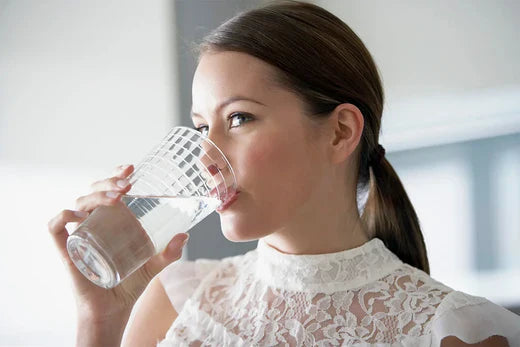
Stay Hydrated for Menstrual Health: Tips to Ease Your Flow
Menstrual health is an essential but often overlooked part of overall wellness. While many focus on diet, exercise, and sleep, hydration is key in easing the discomforts associated with your menstrual cycle. Staying hydrated throughout the month can help alleviate bloating, cramps, headaches, and fatigue, making your period much more manageable. In this blog, we’ll explore hydration's crucial role in menstrual health and offer simple tips to help you feel better during your cycle.
Understanding menstrual health and its challenges

The menstrual cycle can be a rollercoaster of emotions and physical discomforts. During the menstrual phase, many women experience symptoms like bloating, cramps, headaches, mood swings, and fatigue. These symptoms are often intensified by dehydration, which can make managing your period feel even more challenging.
Your cycle typically consists of four phases: the menstrual phase, follicular phase, ovulation, and luteal phase. During menstruation, your body sheds the lining of the uterus, which can lead to a drop in hormone levels, particularly estrogen and progesterone. This fluctuation can cause fluid retention, increased body temperature, and changes in digestion, all of which make hydration more critical than ever.
Hydration helps keep your energy up but also eases some of the discomforts you may face during your period.
How does hydration support menstrual health?
Water is a vital component in maintaining your body’s equilibrium, and during your period, it serves several important functions:
- Eases cramps: Dehydration can cause your muscles to contract more severely, exacerbating cramps. By staying hydrated, you help your muscles relax, reducing the intensity of menstrual cramps.
- Reduces bloating: Water helps balance sodium levels in your body, reducing bloating—a common issue during menstruation. Staying hydrated can prevent your body from holding onto excess water, making you feel less puffed up.
- Relieves headaches: Hormonal shifts during your period can trigger headaches or migraines, which are often worsened by dehydration. Drinking plenty of water can help alleviate this pain and reduce the frequency of headaches during your cycle.
- Improves mood and energy: Dehydration is closely linked to fatigue, and this can feel especially overwhelming during menstruation. Hydration can help keep your energy levels stable and your mood balanced, making it easier to navigate your daily tasks.
Signs of dehydration during menstruation

It’s important to listen to your body and recognize the signs of dehydration, especially during your period. Common signs include:
- Increased thirst: If you feel thirsty more often, your body is signaling that it needs more fluids.
- Dry skin and lips: Dehydration often appears on your skin, making it dry, flaky, or dull.
- Dark-colored urine: Dark yellow or amber urine is a red flag indicating that your body is not getting enough water.
- Fatigue and dizziness: Feeling unusually tired or lightheaded can indicate that your hydration levels are off balance.
If you notice these symptoms, increasing your water intake and prioritizing hydration is a good idea.
Tips to stay hydrated for menstrual health
Here are some practical and easy ways to ensure you stay hydrated and support your menstrual health:
1. Set a hydration goal
Aim for at least 8-10 cups (64-80 oz) of water daily, but the exact amount may vary depending on your activity level and body size. You can also track your hydration with a time tracker water bottle with measurements or use a hydration app to remind you to drink throughout the day.
2. Incorporate hydrating foods
Water-rich foods like watermelon, cucumber, oranges, and celery can also help boost hydration. These foods are packed with water and essential nutrients that support menstrual health. To increase fluid intake, you can make hydrating smoothies or add them to salads.
3. Try herbal teas
Herbal teas, such as chamomile, ginger, or peppermint, are a great way to stay hydrated while addressing menstrual discomfort. Chamomile tea, for example, has anti-inflammatory properties that can soothe cramps, while ginger tea helps reduce bloating and nausea.
4. Keep water handy
Keep a refillable water bottle with you throughout the day to make it easy to drink water. Water within arm’s reach will be a constant reminder to stay hydrated. For a refreshing twist, You can infuse your water with fresh fruits like lemon, berries, or mint.
5. Limit dehydrating drinks
While coffee and alcohol are comforting for many, they are also dehydrating. Caffeine can increase urine output, and alcohol can cause fluid imbalance. During your period, limit these drinks and replace them with hydrating options like water, herbal teas, or coconut water.
6. Add electrolytes if necessary
If you’re experiencing heavy bleeding, you might need to replenish lost electrolytes. Coconut water is a natural source of electrolytes and can help maintain your hydration levels while supporting your menstrual cycle. Avoid sugary sports drinks, as they can worsen bloating and sugar cravings.
FAQs
Can drinking water reduce period pain?
Yes! Staying hydrated can help reduce menstrual cramps by preventing muscle contractions and easing bloating, which in turn helps alleviate pain.
Can overhydration negatively affect menstrual health?
While it's rare, overhydration can lead to an imbalance in electrolytes, causing symptoms like nausea or dizziness. Stick to a balanced amount of water and avoid overconsumption.
Conclusion
Staying hydrated is an easy but often overlooked way to improve menstrual health. Following the tips outlined above can help reduce menstrual cramps, bloating, and fatigue, making your period more manageable. Remember, hydration is essential for your overall health and can be a game-changer when it comes to easing your menstrual symptoms. Drink up and take control of your cycle—you deserve to feel your best, even during your period! Follow WaterH to find more tips for staying well-hydrated.















